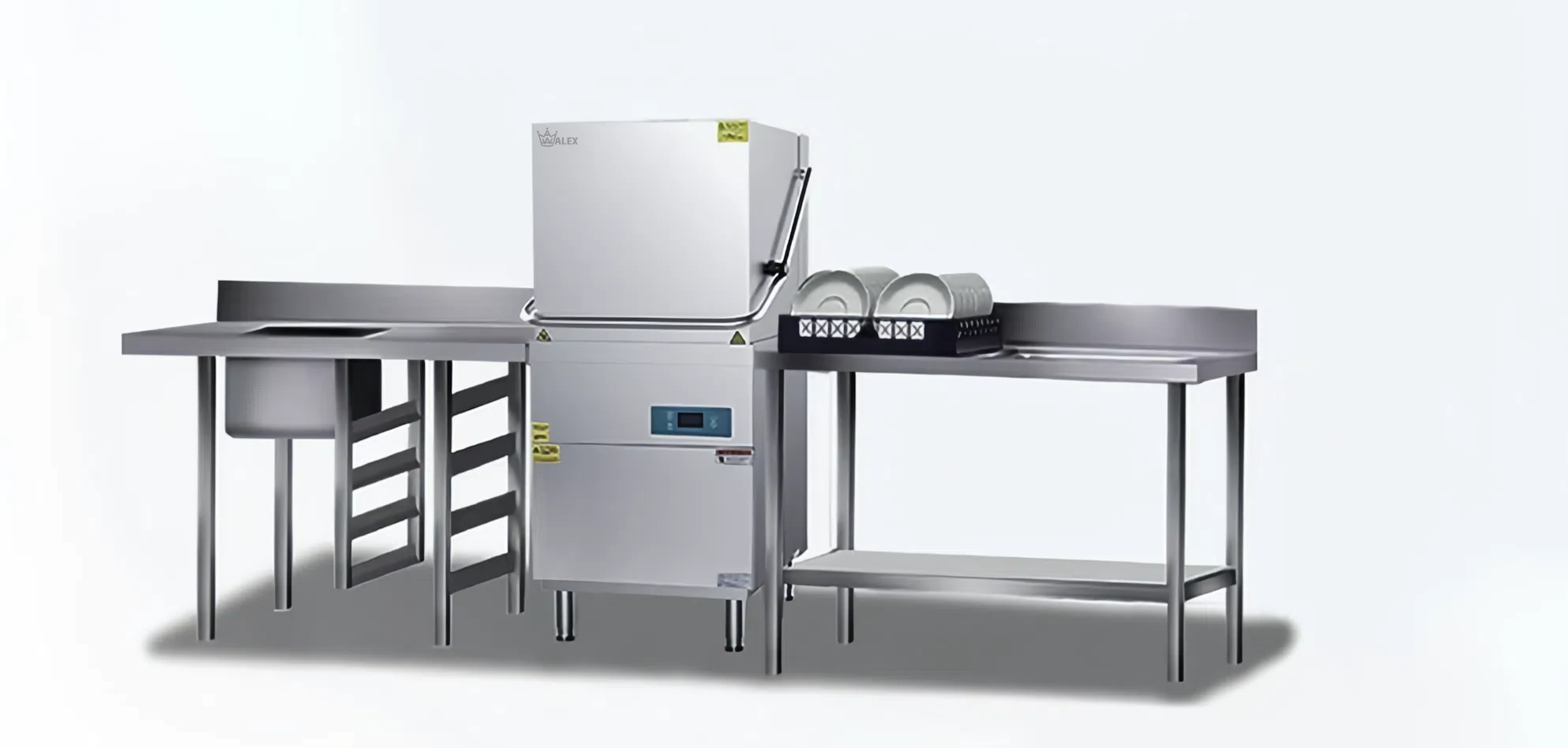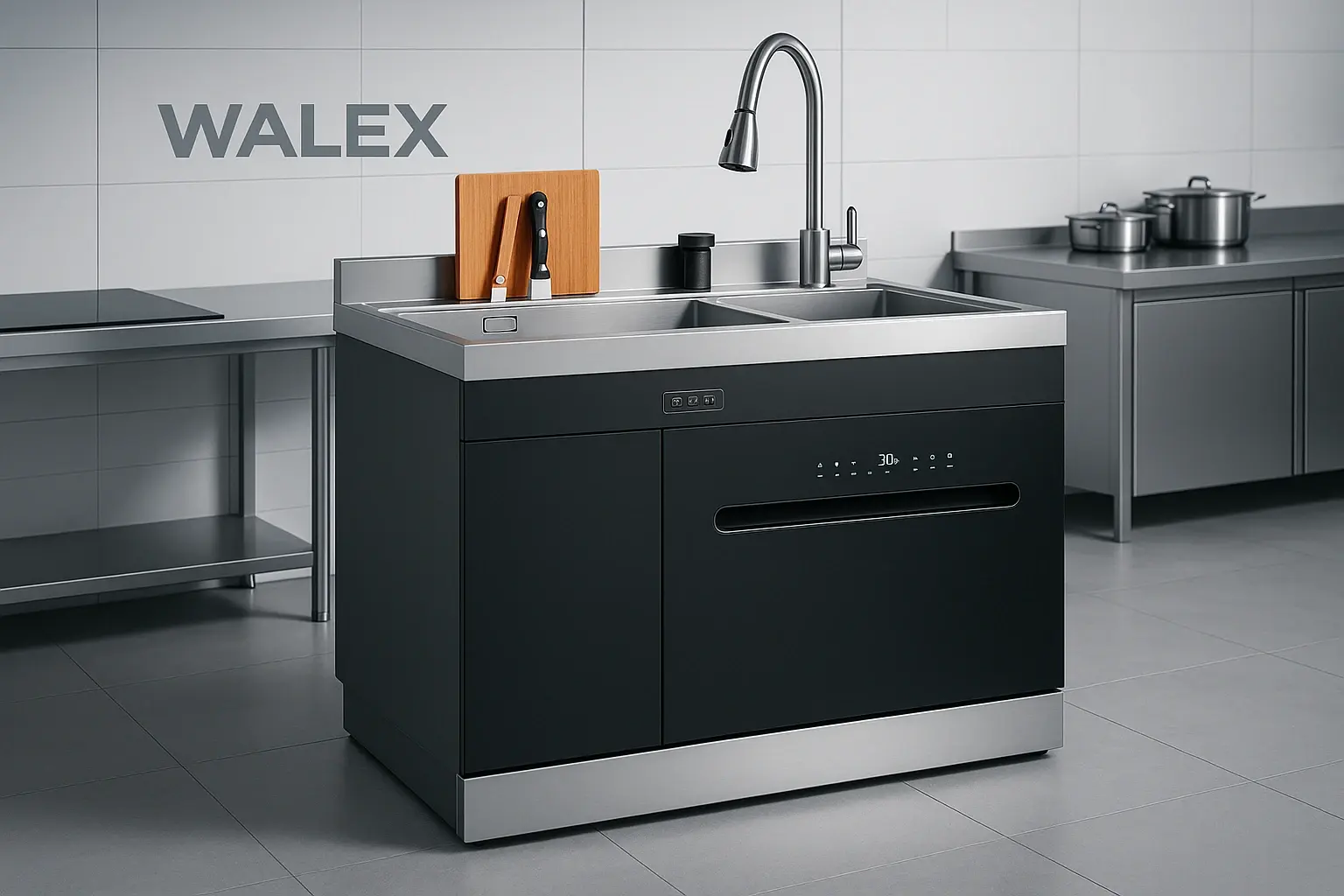Finding the right commercial dishwasher for your business can be overwhelming, especially when you’re trying to balance performance, budget constraints, and operational efficiency. Whether you’re searching to buy commercial dishwasher equipment for a new restaurant, looking for a used commercial undercounter dishwasher to save costs, or specifically seeking washtech dishwasher for sale options, this comprehensive guide will walk you through every aspect of the commercial dishwasher buying process. From understanding different types and specifications to comparing new versus used equipment, we’ll help you make an informed decision that serves your business for years to come.
Understanding Commercial Dishwashers: Definition and Core Functions
A commercial dishwasher is a specialized piece of equipment designed to handle the high-volume dishwashing demands of restaurants, bars, hotels, and institutional kitchens. Unlike residential units, these machines are built for continuous operation, faster cycle times, and compliance with strict health department sanitization standards.
Key Functions and Benefits:
- High-temperature sanitization reaching 180°F to eliminate bacteria and ensure food safety compliance
- Rapid cycle times typically ranging from 1-3 minutes for quick turnaround during busy service periods
- Large capacity handling from 300 to over 20,000 dishes per hour depending on the model
- Chemical sanitization options for energy-efficient cleaning with specialized detergents
- Labor cost reduction by automating the dishwashing process and freeing staff for other tasks
The global commercial dishwasher market, valued at $727.5 million in 2024, is projected to reach $946.5 million by 2030, reflecting the growing demand for efficient kitchen equipment in the expanding foodservice industry1.
Types of Commercial Dishwashers: Complete Breakdown
Understanding the different types of commercial dishwashers is crucial for making the right selection. Each type serves specific operational needs and space requirements.
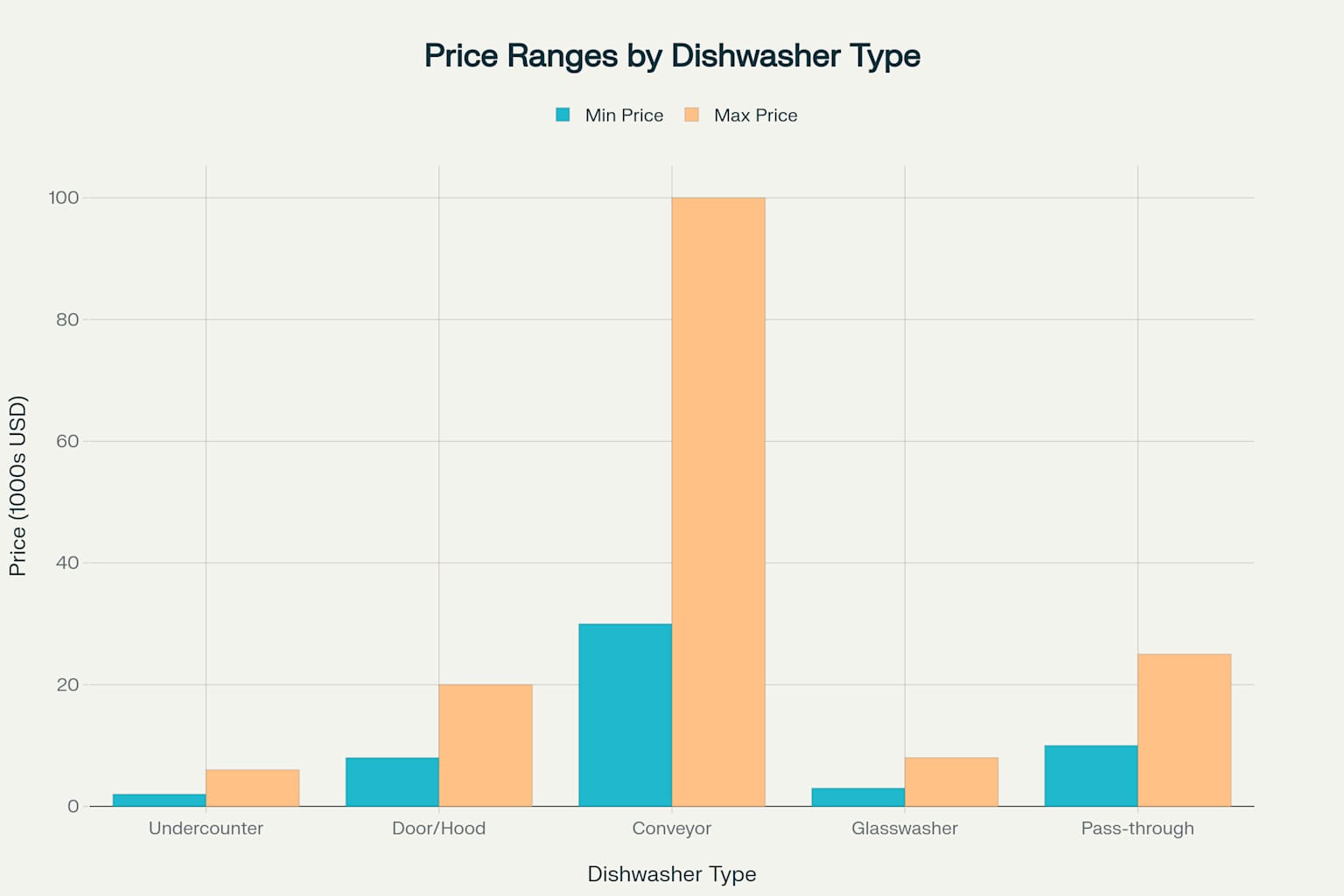
Commercial Dishwasher Analysis: Price and Capacity Ranges – Side-by-side comparison of equipment costs and cleaning capacity for different commercial dishwasher types
Undercounter Dishwashers
Best for: Small cafes, coffee shops, bars, and limited space operations
Undercounter dishwashers are the most compact commercial option, designed to fit beneath standard countertops. These units typically handle 300-1,000 dishes per hour with cycle times of 1-3 minutes. They’re perfect for establishments with limited space but still require commercial-grade cleaning performance.
Key specifications:
- Dimensions: Similar to residential units but with commercial components
- Water consumption: 2.0-4.0 liters per cycle
- Installation: Simple setup with standard electrical and plumbing connections
- Price range: $2,000-$6,000
Door/Hood Type Dishwashers
Best for: Medium-sized restaurants and standard commercial kitchens
Door-type dishwashers offer the ideal balance between capacity and space efficiency. These units feature a lift-up hood or front-opening door design, allowing easy loading at counter height. They typically process 1,000-2,000 dishes per hour and are favored for their ergonomic design that reduces staff fatigue.
Conveyor Dishwashers
Best for: High-volume operations, hospitals, universities, and large restaurants
Conveyor dishwashers represent the heavy-duty segment of commercial dishwashing. These systems use a continuous belt to transport dishes through multiple wash and rinse zones, capable of handling 5,000-20,000+ dishes per hour. While requiring significant space and infrastructure investment, they’re essential for operations where volume and speed are paramount.
Glasswashers
Best for: Bars, pubs, and establishments with high glassware volume
Specialized glasswashers provide gentle yet thorough cleaning specifically designed for glassware. These compact units typically handle 500-1,500 glasses per hour and are essential for maintaining the pristine appearance required for beverage service. Many bars seeking a commercial bar dishwasher for sale specifically need glasswasher functionality.
Pass-through Dishwashers
Best for: Busy restaurants and production kitchens requiring workflow efficiency
Pass-through dishwashers allow loading from one side and unloading from the other, creating an efficient workflow that separates dirty and clean dish areas. These units typically process 1,000-2,500 dishes per hour and are ideal for kitchens where space organization and hygiene protocols are critical.
Commercial Dishwasher Selection Criteria: Your Decision Framework
Selecting the right commercial dishwasher requires careful evaluation of multiple factors. The decision process should begin with a thorough assessment of your operational needs.
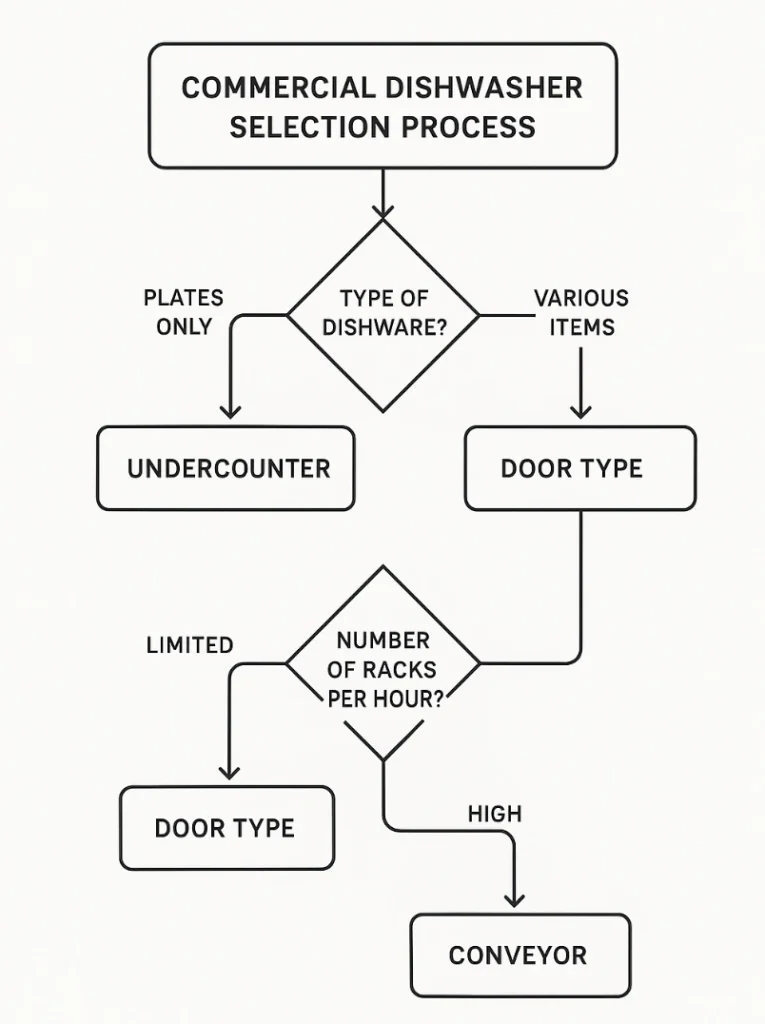
Commercial dishwasher selection decision flowchart for business buyers
Primary Decision Factors:
Kitchen Space and Layout
- Compact spaces: Undercounter or glasswasher options
- Medium kitchens: Door-type or pass-through models
- Large operations: Conveyor systems with dedicated dishwashing areas
Daily Dish Volume Analysis
Calculate your peak hour dish volume by considering:
- Number of covers served during busiest periods
- Types of service (fast-casual vs. fine dining)
- Dish turnover requirements
- Glass volume for beverage-focused establishments
Budget Considerations
Commercial dishwashers represent a significant investment requiring analysis of:
- Initial equipment costs
- Installation and setup expenses
- Ongoing operational costs (energy, water, chemicals)
- Maintenance and repair expenses
- Labor savings potential
Installation Complexity
- Simple installations: Undercounter and glasswasher units
- Moderate complexity: Door-type and pass-through models requiring proper ventilation
- Complex installations: Conveyor systems needing specialized infrastructure, ventilation, and potentially three-phase power
New vs Used Commercial Dishwashers: Comprehensive Comparison
One of the most critical decisions when you commercial dishwasher buy is choosing between new and used equipment. This choice significantly impacts your initial investment, ongoing costs, and operational reliability.
Advantages of New Equipment
Latest Technology and Efficiency:
New commercial dishwashers incorporate the latest energy-saving technologies, including ENERGY STAR certification that can provide up to 17% better energy efficiency compared to standard models2. Modern units feature programmable wash cycles, smart technology integration for remote monitoring, and improved water conservation systems.
Full Warranty Protection:
New equipment typically comes with comprehensive warranties covering:
- Parts and labor for 1-5 years depending on the manufacturer
- Specific component warranties (motors, heating elements) for extended periods
- Access to manufacturer support and service networks
Financing and Customization Options:
New equipment purchases offer:
- Complete financing packages through equipment loans or leasing programs
- SBA loan qualification for qualified businesses
- Full customization options to meet specific operational needs
- Manufacturer training and support programs
Benefits of Used Equipment
Immediate Cost Savings:
Used commercial dishwashers typically offer 30-60% savings on initial purchase price, making them attractive for:
- Startup restaurants with limited capital
- Businesses needing immediate equipment replacement
- Operations with lower volume requirements
Quick Availability:
Unlike new equipment that may require lead times, used dishwashers are often available for immediate delivery and installation, crucial for emergency replacements or rapid business launches.
Key Considerations for Used Equipment Purchases
When considering a used commercial undercounter dishwasher or any used commercial dishwashing equipment:
Age and Operating Hours:
- Units under 5 years old typically offer better reliability
- Request maintenance records and operating hour documentation
- Inspect for visible wear on key components
Warranty and Service History:
- Verify any remaining manufacturer warranty
- Check availability of replacement parts
- Assess service history and previous repairs
Performance Testing:
- Request demonstration of complete wash cycles
- Test water temperature and sanitization capabilities
- Verify all electrical and mechanical components function properly
Commercial Dishwasher Pricing and Cost Analysis
Understanding the total cost of ownership is essential for making an informed purchasing decision. Initial equipment cost represents only a portion of the long-term investment.
Equipment Price Ranges by Type
Undercounter Models: $2,000-$6,000
- Entry-level units suitable for small operations
- Mid-range models with enhanced features and durability
- Premium compact units with commercial-grade components
Door/Hood Type Units: $8,000-$20,000
- Standard models for medium-volume operations
- High-efficiency units with advanced features
- Heavy-duty models for demanding environments
Conveyor Systems: $30,000-$100,000+
- Single-tank conveyor units for medium-high volume
- Multi-tank systems for maximum efficiency
- Custom configurations for specific operational needs
Total Cost of Ownership Analysis
A comprehensive cost analysis must include:
Installation and Setup Costs:
- Basic installation: $500-$1,500 for undercounter units
- Moderate installation: $1,500-$3,000 for door-type units
- Complex installation: $5,000-$15,000 for conveyor systems
Annual Operating Expenses:
- Energy costs vary significantly based on unit efficiency and local utility rates
- Water consumption directly impacts operational costs
- Chemical costs for detergents, rinse aids, and sanitizers
- Regular maintenance and descaling requirements
Labor Savings Calculation:
Commercial dishwashers provide substantial labor savings:
- Undercounter units: $8,000-$12,000 annually
- Door-type units: $15,000-$25,000 annually
- Conveyor systems: $40,000-$80,000 annually
These savings often justify equipment investment within 1-3 years, depending on local labor costs and operational volume.
Installation Requirements and Professional Setup
Proper installation is crucial for optimal performance, safety, and warranty compliance. Commercial dishwasher installation involves multiple systems and regulatory requirements.
Pre-Installation Planning
Space Requirements:
- Adequate clearance for door operation and maintenance access
- Proper ventilation for steam and heat dissipation
- Level flooring capable of supporting equipment weight
Utility Connections:
- Water supply: Hot water at 120-140°F with adequate pressure (200-350 kPa)
- Electrical: Proper amperage and voltage matching equipment specifications
- Drainage: Adequate drainage capacity with proper slope and air gaps
Code Compliance:
Installation must meet local health department requirements, building codes, and manufacturer specifications. Professional installation ensures compliance and maintains warranty coverage.
Post-Installation Testing
Performance Verification:
- Test all wash cycles and temperature settings
- Verify proper chemical dispensing systems
- Check drainage and water temperature consistency
- Confirm safety features and emergency stops function properly
Staff Training:
Proper training ensures optimal performance and longevity:
- Operating procedures and cycle selection
- Daily maintenance routines
- Chemical handling and safety protocols
- Troubleshooting common issues
Maintenance Schedules and Preventive Care
Regular maintenance is essential for maximizing equipment lifespan, ensuring consistent performance, and maintaining health department compliance.
Daily Maintenance Tasks
Filter Care:
Daily filter cleaning prevents debris buildup that can impact cleaning performance and damage internal components. Remove, rinse, and inspect filters at the end of each service day.
Chemical Level Monitoring:
Verify adequate levels of:
- Wash detergent for effective cleaning
- Rinse aid for spot-free drying
- Sanitizer for health compliance
Machine Cleaning:
Clean and dry the machine interior, including wash chamber, door seals, and exterior surfaces.
Weekly and Monthly Maintenance
Water Softener Maintenance:
Replenish salt in water softening systems weekly to prevent scale buildup and maintain cleaning effectiveness.
Descaling Operations:
Monthly descaling removes mineral deposits that can impact heating efficiency and spray arm performance. Use manufacturer-approved descaling solutions and follow recommended procedures.
Professional Service Requirements
Quarterly Inspections:
Professional technicians should inspect:
- Heating elements and thermostats
- Pump operations and seals
- Chemical dispensing systems
- Safety systems and controls
Annual Service:
Comprehensive annual service includes internal component inspection, calibration of temperature and chemical systems, and replacement of wear items.
Safety Standards and Certifications
Commercial dishwashers must meet stringent safety and sanitation standards to ensure food safety compliance and operator protection.
NSF Certification Requirements
NSF/ANSI Standard 3 establishes requirements for commercial dishwashers, including:
Sanitization Performance:
- Minimum 99.999% (5-log) reduction of bacteria
- Final rinse temperatures of 165°F for stationary rack units
- 180°F for all other commercial dishwasher types
Construction Standards:
- Stainless steel construction for durability and sanitation
- Proper drainage and accessibility for cleaning
- Safety interlocks and emergency stops
Energy Efficiency Standards
ENERGY STAR certified commercial dishwashers must meet strict efficiency criteria:
- Version 3.0 specification requires 17% better energy efficiency on average
- Water consumption limits based on machine type and capacity
- Heat recovery technology recognition for additional energy credits
ENERGY STAR certification ensures both environmental compliance and operational cost savings, with potential annual energy cost savings exceeding $230 million industry-wide if all units met certification standards.
Brand Comparison and Selection Guide
Selecting the right manufacturer is crucial for long-term satisfaction, service support, and parts availability.
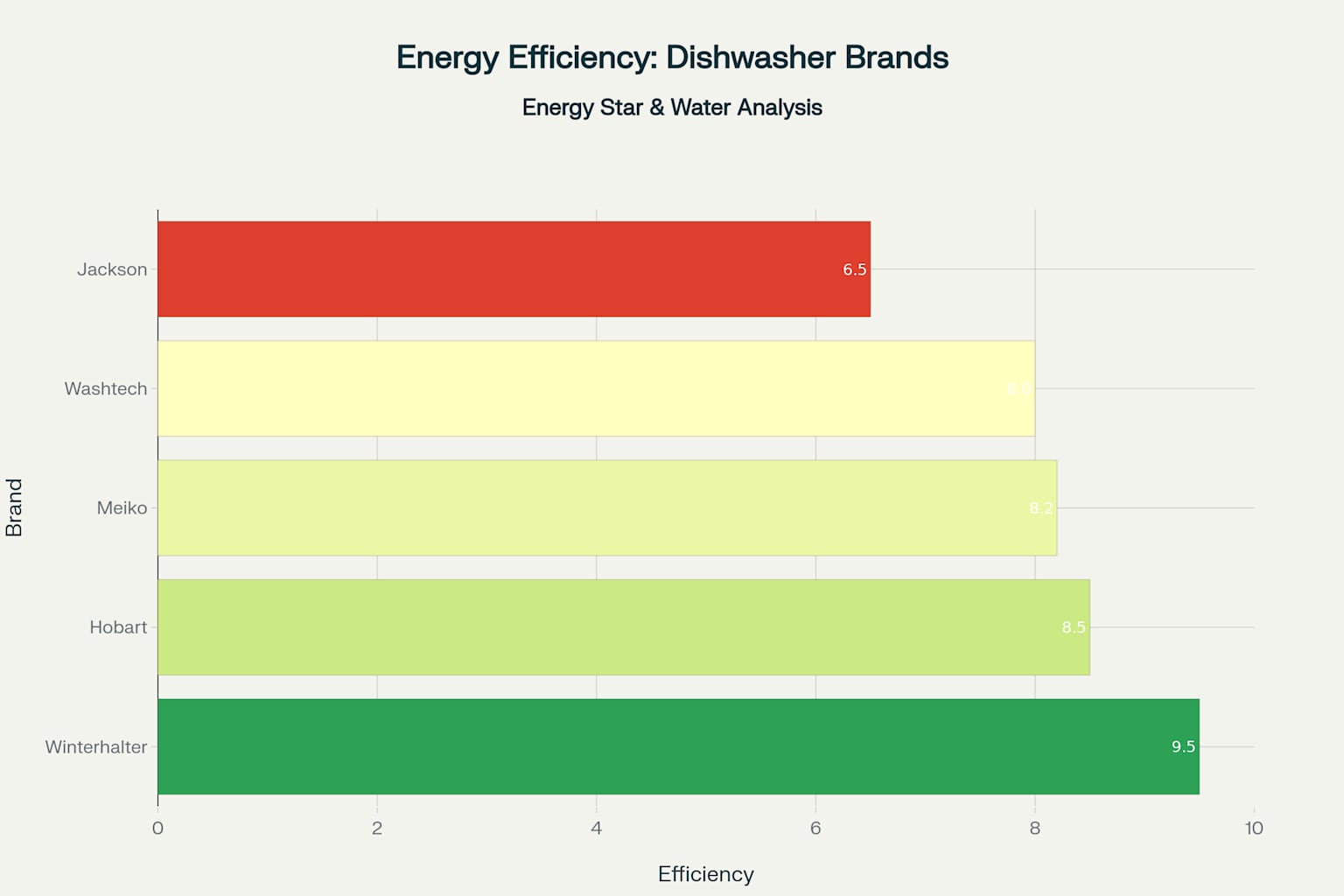
Energy Efficiency Ratings of Top Commercial Dishwasher Brands – Comparison based on Energy Star ratings and water consumption analysis
Premium Brand Analysis
Hobart:
- Market-leading reliability with 9/10 rating
- Extensive service network across North America
- Higher initial investment justified by superior performance
- Best for high-volume operations requiring maximum uptime
Winterhalter:
- Industry-leading energy efficiency (9.5/10 rating)
- Advanced technology features and connectivity options
- Premium pricing with exceptional long-term value
- Ideal for operations prioritizing efficiency and sustainability
Mid-Range Options
Washtech:
- Excellent value proposition for small to medium restaurants
- 1-5 year warranty options providing extended protection
- Good service network availability
- Popular choice for establishments seeking washtech dishwasher for sale options
Meiko:
- Compact operation specialists
- Strong performance in space-constrained environments
- Good reliability rating (8/10) with competitive pricing
Budget-Conscious Choices
Jackson:
- Entry-level commercial units for budget-conscious buyers
- Adequate performance for lower-volume operations
- Limited efficiency but acceptable for cost-focused decisions
Troubleshooting Common Issues
Understanding common problems and solutions helps maintain optimal performance and minimize downtime.
Performance Issues
Poor Cleaning Results:
Most commonly caused by blocked spray arms, incorrect detergent concentration, or overloading. Regular cleaning of spray arms and proper loading techniques resolve most issues.
Water Temperature Problems:
Low water temperature affects both cleaning and sanitization. Check heating elements, thermostat settings, and incoming water temperature. Professional service may be required for component replacement.
Operational Problems
Machine Won’t Start:
Verify power connections, door closure, and emergency stop positions. Check control panel settings and error codes before calling for service.
Excessive Cycle Times:
Usually indicates scale buildup, low water pressure, or clogged filters. Regular descaling and filter maintenance prevent most timing issues.
Financing Options and Purchase Strategies
Commercial dishwasher purchases can be financed through various programs designed to preserve working capital and spread costs over time.
Equipment Financing Options
Traditional Equipment Loans:
- Equipment serves as collateral, reducing down payment requirements
- Fixed interest rates provide predictable monthly payments
- Terms typically match equipment useful life (3-7 years)
SBA Loan Programs:
- Government-backed loans for qualified small businesses
- Lower interest rates and longer terms than conventional financing
- May include soft costs like installation and training
Leasing Programs:
- Lower upfront costs with monthly payment structure
- Maintenance and service packages often available
- End-of-lease purchase or upgrade options
Purchase Timing Strategies
End-of-Quarter Deals:
Manufacturers often offer incentives during quarter-end periods to meet sales targets.
Trade Show Promotions:
Industry trade shows frequently feature special pricing and package deals.
Used Equipment Opportunities:
Restaurant closures and upgrades create opportunities for quality used equipment purchases.
Frequently Asked Questions
Q: How do I determine the right size commercial dishwasher for my restaurant?
A: Calculate your peak hour dish volume by multiplying maximum covers served by average dishes per customer. Add 20-30% capacity buffer for busy periods. Consider dish types (plates vs. glasses) and turnaround time requirements.
Q: What’s the difference between high-temperature and low-temperature dishwashers?
A: High-temperature units use 180°F+ water for sanitization and faster drying but require more energy. Low-temperature units use chemical sanitization with 120-140°F water, offering energy savings but requiring chemical replenishment.
Q: Should I buy new or used commercial dishwashing equipment?
A: New equipment offers latest technology, full warranty, and financing options but requires higher investment. Used equipment provides 30-60% cost savings with immediate availability but may have higher maintenance costs and limited warranty coverage.
Q: How often do commercial dishwashers need professional service?
A: Quarterly professional inspections and annual comprehensive service are recommended. High-volume operations may require more frequent service. Daily and weekly maintenance by staff extends equipment life and reduces service needs.
Q: What certifications should I look for in a commercial dishwasher?
A: NSF/ANSI Standard 3 certification ensures sanitization performance and food safety compliance. ENERGY STAR certification provides energy efficiency verification. Check local health department requirements for specific certifications needed in your area.
Q: Can I install a commercial dishwasher myself?
A: While simple undercounter units may allow basic installation, professional installation is recommended for warranty compliance, safety, and optimal performance. Complex units require licensed electricians and plumbers for proper installation.
Q: How long do commercial dishwashers typically last?
A: With proper maintenance, commercial dishwashers typically operate effectively for 10-15 years. High-volume operations may see shorter lifespans (7-10 years), while lower-volume users may achieve longer service life. Regular maintenance significantly impacts longevity.
This comprehensive guide provides the foundation for making informed commercial dishwasher purchasing decisions. Whether you’re evaluating options to buy commercial dishwasher equipment, comparing new versus used alternatives, or seeking specific models like washtech dishwasher for sale, understanding these key factors ensures you select equipment that serves your operation effectively for years to come.
